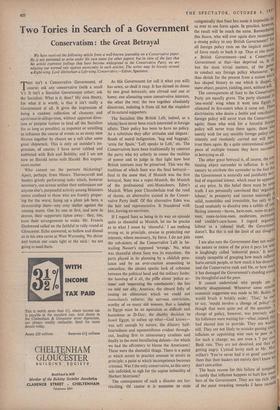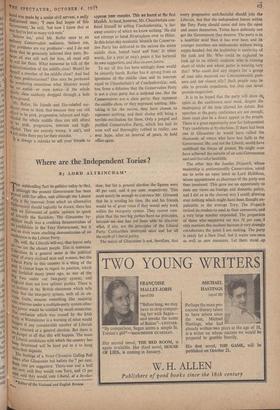Two Tories in Search of a Government
Conservatism: the Great Betrayal
We have received the following article from a well-known journalist on a Conservative paper. He is not permitted to write under his own name for other papers; but in view of the fact that his article expresses feelings that have become widespread in the Conservative Party, we are relaxing our normal rule against anonymity in such articles. The writer may be loosely termed a Right-wing, Lord Altrincham a Left-wing, Conservative.—Editor, Spectator.
is isn't a Conservative Government, of fcourse; ask any conservative (with a small 'c'). It isn't a Socialist Government either; ask the Socialists. What is it, then? My own theory, for what it is worth, is that it isn't really a Government at all. It gives the impression of being a random collection of chancers and apres-moi-le-deluge-men, without apparent direc- tion or purpose (unless to fend off the Socialists for as long as possible); as impotent or unwilling to influence the course of events as so many men thrown together by chance on a raft after some great shipwreck. This is only an outsider's im- pression, of course; I have never rabbed and bobbitied with Rab and Bobbity, and I am not now on Harold terms with Harold. But impres- sions matter.
Who cannot see the portents thickening? Apart, perhaps, from Messrs. Thorneycroft and Sandys grimly performing tasks which, however necessary, can arouse neither their enthusiasm nor anyone else's, purposeful activity among Ministers seems confined to those who are frankly prepar- ing for the worst, lining up a .plum job here, a directorship there—any cosy shelter against the coming storm. One by one at first, and now in droves, their supporters tiptoe away: they, too, have their arrangements to make. Mr. Francis Dashwood called on the faithful to rally round at Gloucester. Echo answered, as hollow and dismal as in his own caves at West Wycombe. We shiver and button our coats tight at the neck : we are going to need them. As this Government (or call it what you will) has sown, so shall it reap. It has earned its doom by two great betrayals; one abroad and one at home; one alienating some conservative interests, the other the rest; the two together absolutely disastrous, isolating it from all but the stupidest of its natural supporters.
The Socialists (the British Left, indeed, as a whole) have never been much interested in foreign affairs. Their policy has been to have no policy. As a substitute they offer attitudes and slogans : floods of moral indignation, 'bag and baggage,' 'arms for Spain,' Left speaks to Left,' etc. The Conservatives have been traditionally by contrast the party who try soberly to assess the realities of power and to judge in that light how best British interests may be preserved. This was the tradition of which Suez was the final betrayal— final in the sense that, if Munich was the first betrayal, Suez was a super-Munich, the Munich of the professional anti-Municheers, Eden's Munich. When poor Chamberlain trod the road of shame, an alternative existed in the Conser- vative Party itself. Of this alternative Eden was the heir and representative. It foundered with him, leaving no survivors.
If I regard Suez as being in its way an episode quite as shameful as Munich, let me be precise as to what I mean by 'shameful.' I see nothing wrong or, in principle, unwise in protecting our interests, where necessary, by force. I do not join the sob-sisters of the Conservative Left in be- wailing Nasser's supposed 'wrongs.' No, what was shameful about Suez was its execution : the parts played in its planning by a childish petu- lance and by an over-caution, amounting to cowardice; the almost spastic lack of cohesion between the political head and the military limbs; the humbug of it all, the piffle about 'police ac- tions' and 'separating the combatants'; the lies we told our ally, America; the absurd folly of issuing an ultimatum which we could not immediately enforce; the nervous conviction, worthy of so many old women, that a landing in Egypt must be an operation as difficult and hazardous as D-Day; the shabby decision to bomb Egypt, to soften up what—God knows— was soft enough by nature; the dilatory half- heartedness and squeamishness evident through- out, leading first to unnecessary cruelties and finally to the most humiliating defeats—for which we had the effrontery to blame the Americans ! These were the shameful things. There is a point at which errors in practice amount to errors in principle; a point at which incompetence becomes criminal. Was I the only conservative, as this sorry tale unfolded, to sigh for the supine imbecility of Herbert Morrison?
The consequences of such a disaster are far- reaching. Of course it is nonsense to state categorically that Suez has made it impossible fur us ever to use force again. In practice, however' the result will be much the same. Remembering, this fiasco, who will ever again dare recommeila a strong policy to any British Government? Yet all foreign policy rests on the implicit sanction of force ready to back it up. Thus at o'ne strae a British Government—and a Conservative, Government at that—has deprived us, to 81 but the most trivial matters, of the Power to conduct any foreign policy whatsoever. We thus shrink for the present from a nation which has shaped history to one which is shaped, 3 mere object, passive, yielding, inert, without will. The consequences of Suez to the Conservative Party are equally grave. The party alienated its 'one-world' wing when it went into Egypt; it alienated its fire-eaters when it came out. Thnse doctrinaires who desire a feeble and conciliatorY foreign policy will never trust the Conservatives again; those who wish for a forceful forciP policy will never trust them again; those No° merely wish for any sensible foreign policy O°. sistently and resolutely carried out will nevef trust them again. By a quite unintentional master: piece of multiple treason they have succeed° in betraying us all. The other great betrayal is, of course, the Cow tinuing abject surrender to inflation. It is col' tomary to attribute this surrender to the fact that the Government is naturally and justifiably ten+ fled of organised labour, which must be appeaSed at any price. In this belief there must be soot! truth. I am personally convinced that 'organise° labour,' in prosperity and success seeminglY 5° solid, monolithic and irresistible, has only to b4 faced resolutely to dissolve into a rabble of coo' flicting interests—haves, have-nots, more-to-On' men, more-to-loge-men, moderates, extreist; m and couldn't-care-lesses. I regard organise labour as a colossal bluff; the Government doesn't. But this is not the limit of our disagree. ment.
I am also sure the Government does not realise the nature or extent of the price it pays for what is laughingly called 'industrial peace.' It seen simply incapable of grasping how much inflatioa hurts certain people, or how much it has demornl' ised the Conservative rank and file, or how nit° it has damaged the Government's standing among the thoughtful and the poor. It cannot understand why people are 50 bitterly disappointed. Whenever some sensible economic suggestion was made to Mr. Butler, be would brush it briskly aside: 'That,' he use to say, 'would involve a change of though that were quite out of the question. Pt change of policy, however, was precisely vi'19, his followers were waiting for—what, indeed, the' had elected him to provide. They are waitiog still. They are not likely.to mistake gassing aboli: inflation or appointing wise men to peer at 3 for such a change; no, nor even a 7 per con' Bank rate. They are not deceived, and they are getting angry. Cynical levity such as Mr. Mae: millan's 'You've never had it so good' convince' them that their leaders not merely don't know bill don't care either. The basic reason for this failure of symPatil is surely that inflation happens to hurt few men: bers of the Government. They are too rich. of the most revealing remarks I have recent beard was made by a senior civil servant, a sadly disillusioned man: 'I once had hopes of this Government,' he said, 'but now I know that at root they're just so many rich men.' Believe me,' cried Mr. Butler once to an Ordinary Conservative audience, 'believe me, Your problems are my problems'—and I do not doubt that he genuinely believed they were. Be- 'se all was still well for him, all must still be well for them. What nonsense to talk of the Pr.oletarianisation of the middle class! Wasn't he rillmself a member of the middle class? And had 11,.e been proletarianised? One may be pardoned !or wondering sometimes what Minister would bat an eyelid—or even notice—if the whole 'fiddle class suddenly dropped through a hole la the ground.
Mr. Butler, his friends and like-minded suc- cessors seem to think that because they can still afford to be pink, progressive, tolerant and high-
:1)111(1"i the whole middle class can still afford to be be M. a pink, progressive, tolerant and high-
They are entirely wrong; it can't, and It Will make them pay for their mistake. It is always a mistake to sell your friends to
appease your enemles. This we learnt at the first Munich. At least, however, Mr. Chamberlain con- fined himself to selling Czechoslovakia, 'a far- away country of which we know nothing.' He did not attempt to hand Birmingham over to Hitler. In this latter-day economic Munich the Conserva- five Party has delivered to the unions the entire middle class, bound hand and foot; in other words, for a year or two's peace it has bartered its own supporters; and thus its own future.
To say all this has been wittingly done would be absurdly harsh. Rather has it sprung from an ignorance of the Middle class and its interests equal to Chamberlain's of Czechoslovakia; and, too, from a delusion that the Conservative Party is not a class party but a national one. But the Conservatives are a class party; they represent the middle class, or they represent nothing. Mis- taking it for the nation, they have chosen to represent nothing; and their choice will bring a terrible retribution for them. Only a purged and purified Conservative Party, which has had its nose well and thoroughly rubbed in reality, can ever hope, after an interval of years, to hold office again.























































 Previous page
Previous page